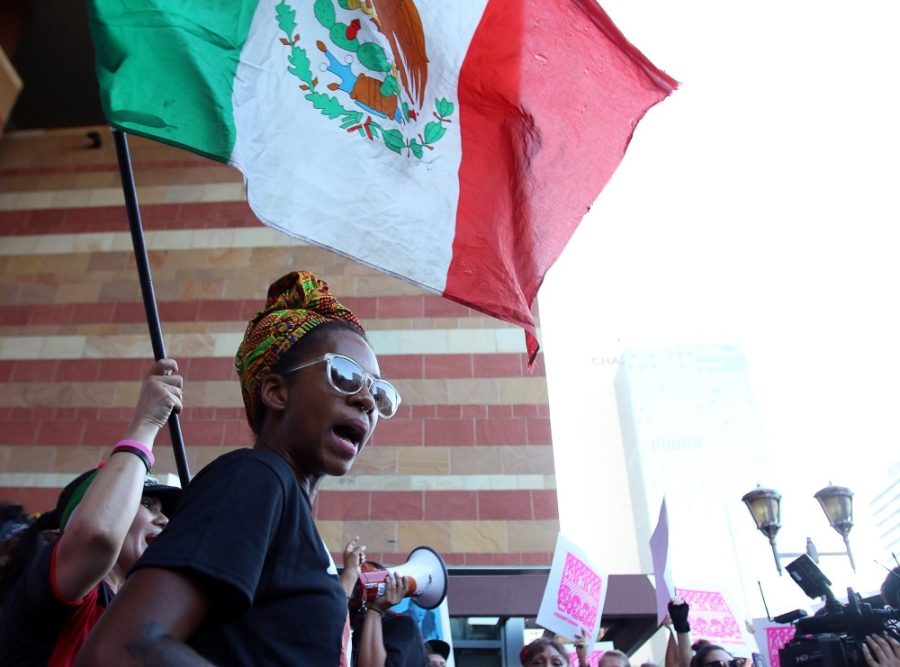President Donald Trump followed his campaign promises by signing two executive orders for the southern border wall and immigration policy.
The wall
The plan is to start construction as soon as possible on the wall across a large section of the 2,000-mile-long border and to limit immigration from several countries with Muslim majorities, including Yemen, Sudan, Iraq, Iran, Libya, Somalia and Syria.
Many of these countries are facing refugee crises due to U.S. or other foreign intervention.
The executive order for the southern border wall caused Enrique Peña Nieto, the President of Mexico, to cancel his upcoming trip to the U.S.
No specific cost details have been announced, but Trump has said Mexico will ultimately pay for the wall, which is estimated to cost upwards of $20 billion or more.
RELATED: UA students walk out in protest of President Trump’s climate change vision
Benjamin Fortna, director and professor of modern Middle East and Ottoman Empire history at the UA, said the planned policies worry him.
“It should concern everybody; not just a question for Muslims, but the way we deal with people who are different from ourselves is pretty worrisome,” Fortna said.
According to the Pew Research Center statistics, the amount of migrants apprehended at the border is at its lowest point in 50 years.
“In fiscal 2015, the Border Patrol made 188,122 apprehensions of Mexican migrants at U.S. borders …the lowest number of apprehensions on record since 1969, when there were 159,376 apprehensions,” said the center’s website.
The Pew Research Center polling of the 4,138 adult members on the American Trends Panel nationwide said 39 percent viewed the new border wall as “very or somewhat important.”

The additional personnel in the executive order are 5,000 border patrol agents and triple the amount of Immigration and Customs Enforcement officers, which will need approval by Congress.
Fortna said it is encouraging when people stand up and getting involved in their communities.
“If we’re looking for signs of encouragement … local communities and people who are concerned about a whole range of issues—including refugees, immigration, human rights—are people revved up and organized perhaps more than they’ve felt they’ve needed to be in recent years,” he said.
Trump said in an interview with ABC News that the U.S. will keep the people who are succeeding, like the “DREAMers,” separate from the criminals.
“Where you have great people that are here that have done a good job, they should be far less worried,” Trump said. “We’ll be coming out with policy on that over the next period of four weeks.”
The status of immigration
Trump signed an executive order that will restrict refugees from entering into the U.S. for a period of time of 120 days, and later places a limit on how many people can enter coming from countries that have a majority of Muslim citizens.
Only 50,000 refugees would be permitted to settle in the U.S., a cut from the previous 110,000 under former president Barack Obama.
Sarah Hemzawi, a 2015 UA biology graduate, said Trump’s recent policies have not supported everyone.
“He’s already targeted so many different groups, and I think the downfall of it is that he isn’t supporting the people he’s supposed to be representing,” she said. “At the same time I’ve seen so much positivity coming out from people joining together.”
Discrimination is already occurring, like at the UA, and the different policies announced under the Trump administration could fuel that, according to Fortna.
“We’ve seen alarming signs of that on our own campus when some of the dormitories have dumped garbage and thrown stuff onto the mosque next door to them,” he said.

RELATED: Air of uncertainty surrounds Trump on Inauguration Day
Refugees from Syria and Iraq, among other countries, would also be under more strict vetting processes when attempting to come to the U.S.
Melanie Cooley, an organizer with Arizona Welcomes Refugees, said that the policy would hurt U.S. relations.
“This kind of policy hurts our national security; it is counterproductive to say that refugees are intensely and extremely bad,” she said. “To say that we don’t know who’s coming in is a lie. They go through extensive checks.”
She said that it’s better to try to understand the different situations people and their families go through.
When it comes to sanctuary cities, the executive order would deny them receiving federal grants.
Politicians have already spoken out against the act while reaffirming support for sanctuary cities.
Fortna believes that more people on local levels will continue to speak out and connect with one another.
“I would think we’re going to see a big response in terms of grass-roots activity and local activity,” he said.
Hemzawi said she believes in people actively changing negative views into positive ones.
“I think in these times it’s the power of the people coming together,” she said. “People themselves are going to do things from their hearts to help each other.”
Follow Shaq Davis on Twitter.








